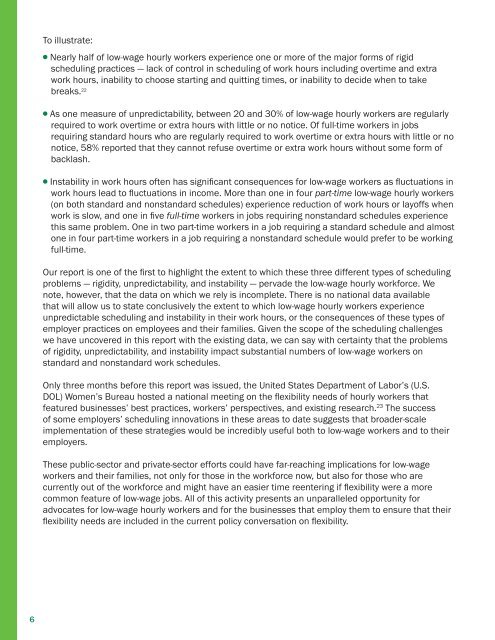Flexible Workplace Solutions for Low-Wage Hourly Workers
Flexible Workplace Solutions for Low-Wage Hourly Workers
Flexible Workplace Solutions for Low-Wage Hourly Workers
Create successful ePaper yourself
Turn your PDF publications into a flip-book with our unique Google optimized e-Paper software.
To illustrate:<br />
● Nearly half of low-wage hourly workers experience one or more of the major <strong>for</strong>ms of rigid<br />
scheduling practices — lack of control in scheduling of work hours including overtime and extra<br />
work hours, inability to choose starting and quitting times, or inability to decide when to take<br />
breaks. 22<br />
● As one measure of unpredictability, between 20 and 30% of low-wage hourly workers are regularly<br />
required to work overtime or extra hours with little or no notice. Of full-time workers in jobs<br />
requiring standard hours who are regularly required to work overtime or extra hours with little or no<br />
notice, 58% reported that they cannot refuse overtime or extra work hours without some <strong>for</strong>m of<br />
backlash.<br />
● Instability in work hours often has signifi cant consequences <strong>for</strong> low-wage workers as fl uctuations in<br />
work hours lead to fl uctuations in income. More than one in four part-time low-wage hourly workers<br />
(on both standard and nonstandard schedules) experience reduction of work hours or layoffs when<br />
work is slow, and one in fi ve full-time workers in jobs requiring nonstandard schedules experience<br />
this same problem. One in two part-time workers in a job requiring a standard schedule and almost<br />
one in four part-time workers in a job requiring a nonstandard schedule would prefer to be working<br />
full-time.<br />
Our report is one of the fi rst to highlight the extent to which these three different types of scheduling<br />
problems — rigidity, unpredictability, and instability — pervade the low-wage hourly work<strong>for</strong>ce. We<br />
note, however, that the data on which we rely is incomplete. There is no national data available<br />
that will allow us to state conclusively the extent to which low-wage hourly workers experience<br />
unpredictable scheduling and instability in their work hours, or the consequences of these types of<br />
employer practices on employees and their families. Given the scope of the scheduling challenges<br />
we have uncovered in this report with the existing data, we can say with certainty that the problems<br />
of rigidity, unpredictability, and instability impact substantial numbers of low-wage workers on<br />
standard and nonstandard work schedules.<br />
Only three months be<strong>for</strong>e this report was issued, the United States Department of Labor’s (U.S.<br />
DOL) Women’s Bureau hosted a national meeting on the fl exibility needs of hourly workers that<br />
featured businesses’ best practices, workers’ perspectives, and existing research. 23 The success<br />
of some employers’ scheduling innovations in these areas to date suggests that broader-scale<br />
implementation of these strategies would be incredibly useful both to low-wage workers and to their<br />
employers.<br />
These public-sector and private-sector ef<strong>for</strong>ts could have far-reaching implications <strong>for</strong> low-wage<br />
workers and their families, not only <strong>for</strong> those in the work<strong>for</strong>ce now, but also <strong>for</strong> those who are<br />
currently out of the work<strong>for</strong>ce and might have an easier time reentering if fl exibility were a more<br />
common feature of low-wage jobs. All of this activity presents an unparalleled opportunity <strong>for</strong><br />
advocates <strong>for</strong> low-wage hourly workers and <strong>for</strong> the businesses that employ them to ensure that their<br />
fl exibility needs are included in the current policy conversation on fl exibility.<br />
6

















